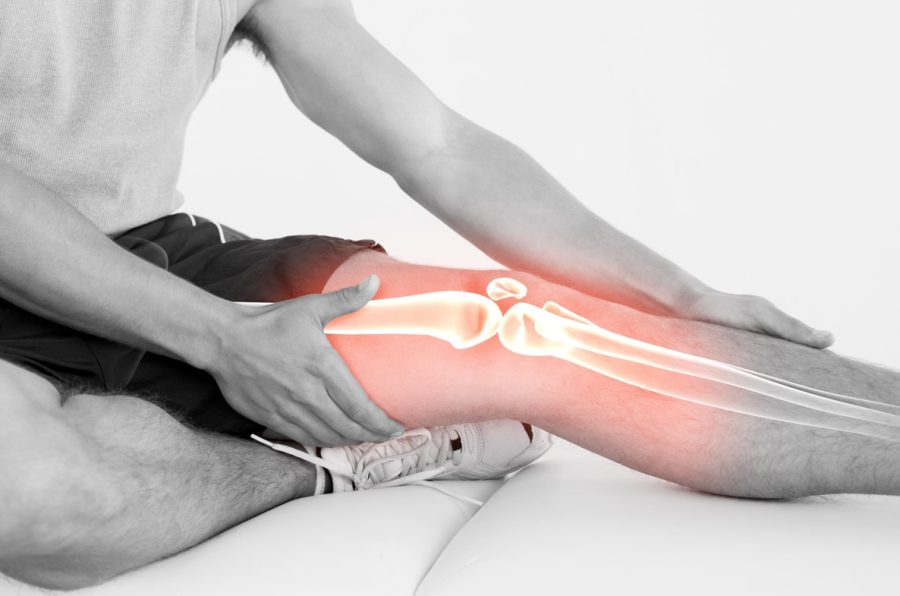When you walk up a flight of stairs, you might hear popping sounds coming from your knees. This may be something that you’ve noticed for a long time, or perhaps these sounds are new and are cause for concern. Knee popping, also known as crepitus, is often a harmless occurrence, but there could be a more serious problem with your knees that’s causing the strange sounds and sensations.
Bubbles from Gas
The synovial fluid that keeps your knees and other joints lubricated can form gas bubbles in it. Walking up steps or being physically active in other ways can cause these bubbles to burst as the knees move. As these bubbles burst, popping sounds may be heard coming from the knees. These bubbles shouldn’t cause pain as they burst and don’t indicate any knee problems. The bubbles from gas in your knees is typically the same as when you pop your knuckles. These bubbles, however, may be related to your knee joints being slightly out of alignment. If that is the case, then you may start to feel like your knee is less fluid feeling and you may start to feel pain. The bubbles are not what is causing this pain but it is common for people to have bubbles along with other issues that are actually causing the pain.
Runner’s Knee
Also known as patellofemoral syndrome, the runner’s knee is a common injury among avid runners and other workout enthusiasts who may be putting too much pressure on their knees when exercising. If you have this condition, you might notice that an affected knee has a certain “crunchiness” as you move it along with audible popping sounds. Things like running on cement or an old treadmill, for example often have a hard impact on your knees and this can cause issues. Runner’s knee can also be caused by a misalignment problem with your bones and joints, and a chiropractor can offer treatment that’s intended to help align your knee and the supporting structures better. Similar to how a chiropractor can help align the joints in your back, they can help adjust the alignment of your knees to make the “crunchiness” go away and create a movement that feels buttery as you move it. Chiropractors are specially trained to feel where the alignment is needed and if there are any issues that require adjustments so they are likely the best option for getting your knee back to its best performance. With things like runner’s knee, however, it is unlikely that you’ll be able to get it adjusted once and then not need an adjustment for the rest of your life. Unless you change the patterns that cause the knee problems such as running on soft gravel and with perfect form, then it is likely that your knee will become “crunchy” again and alignment will be needed again. With that being the case, it may be worth asking your chiropractor about their recommendations for preventing it in the future. One thing that is commonly recommended is physical therapy and strengthening the muscles around your knees. That way the muscles can provide stability and decrease the chances that it gets out of alignment again.
Knee Instability
Several factors could cause a knee joint to become unstable and pop as it moves. Ligament sprains and tears are common culprits, or you could have a natural abnormality around the knee joints that makes them less stable. Supporting muscles of the knee that are injured could also cause the knee to shift out of place and pop when you’re moving. This is more common with older patients and typically isn’t an issue for youth or young adults as long as they are being intentional with their movement. That being said, some sports are more likely to cause issues. For example, basketball is one of the harshest sports on the knees due to the quick change in direction and hard forces on the knees while moving around the court. Treatment options will depend on the exact cause of your knee instability but could include physical therapy, chiropractic care, or surgery. When it comes to physical therapy, a common result is that the muscles surrounding your knees are bigger and thus can support the joint better. For this reason, many doctors recommend physical therapy as it can frequently solve the problem while also preventing additional problems in the future.
Osteoarthritis
Osteoarthritis is arthritis of the knee joint and causes knee cartilage to disintegrate over time. As the cartilage wears away, you may hear popping sounds coming from your knees. The popping sounds may also be accompanied by knee pain. Treatments for osteoarthritis often include pain medications, physical therapy, and cortisone or lubrication injections. Surgery may be required to resolve more serious cases of osteoarthritis. However, surgery is typically a last resort as it is harder to recover from. That being the case, if your knee is degraded to the point where you can’t walk, then replacing the knee joint may be the only option for being able to walk again. After a surgery like that, however, physical therapy will be even more important to ensure that your knee is able to recover and support your body.
You might be alarmed by the sound of popping knees, but the cause isn’t always serious. If you end up needing treatment to resolve your popping knee problem and any other associated symptoms, you can visit a medical professional for care.

